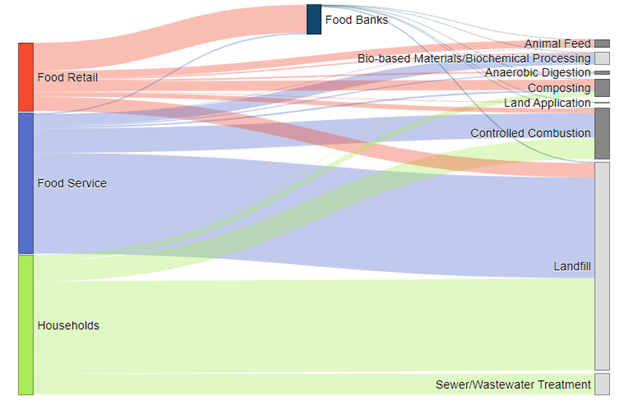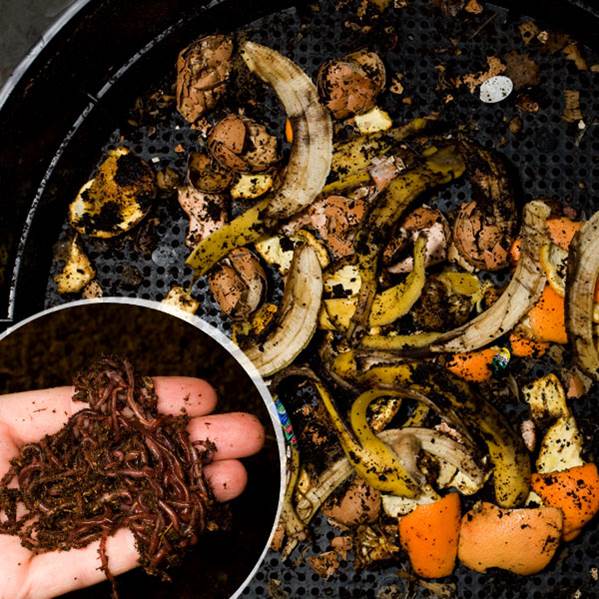ABC's of Recycling,
F- Food for Thought
Jun 03 2022
Sometimes it can feel as if our recycling challenges are overwhelming. How can one person or even one household make a difference? But there is one place that average households working together will have a big impact on the health of our environment and our citizens.
Food waste. Or food scrap, as we like to call it. Why ‘scrap?’ Because in business terms, waste is something that goes to landfill and scrap is material that can be re-used.
Whether you consult the USDA, the EPA, or a non-profit source for the statistics, everyone agrees that between thirty and forty percent of all food in the US is wasted.
Feeding America spells out the problem. “Each year, 108 billion pounds of food is wasted in the United States. That equates to 130 billion meals and more than $408 billion in food thrown away each year.” For 2021, this national non-profit focused on addressing hunger projected 1 in 8 American adults would experience food insecurity and as many as 1 in 6 children go hungry.
108 billion pounds of wasted food a year! Our food system is “radically inefficient,”says non-profit ReFED.
Where is all this wasted food coming from?
Some of it comes from commercial businesses like grocery stores and restaurants, or hotels and sports venues. Some of it comes from food managed by larger institutions like hospitals, offices, and schools.

Shockingly, the biggest area of food waste is the residential sector. Homes, apartments, condos–all of us create the largest portion of the food that’s wasted in the US–39% according to Feeding America.
Ready for more bad news? Most of the residential food that is thrown away goes into landfill. In fact, food is the single largest category of waste in municipal landfills.
That’s a problem. Because food in landfill releases methane as it decomposes. Methane is a greenhouse gas that is worse than carbon dioxide. (Which explains why municipal landfills are a HUGE source of methane emissions.)
The bottomline?
Wasted food has an enormous impact on the the health of our citizens and our environment.
Reduce the food YOU waste
Because residential waste is such a big portion of what goes into landfill, tossing out less food creates a variety of positive impacts.
- It will save you money. The USDA estimates that, “The average family of four spends $1,500 each year on food that ends up uneaten.”
- Less waste means fewer trucks on the road hauling food. It means less fertilizer and water used. Altogether, that means overall lower greenhouse gas (GHG) emissions from the production, transport, processing, and distribution of food.
- Best of all, reducing food scrap in landfill means less methane gas emitted by landfill–the third-largest source of human-related methane emissions in the United States.”
And of course, less waste also creates the opportunity to redirect resources toward those who are food insecure, which helps keep people, especially children and the elderly, from suffering with hunger.
OK, tell me how.
There are lots of simple ways you can reduce the amount of waste that is generated by food and its packaging. And lots of places that want to help with advice. Here’s a few suggestions that come up again and again:
- Plan your meals before you shop and make a list of the things you need. Oh, and don’t buy it, if it’s not on the list!
- To reduce packaging waste, choose items that aren’t wrapped in plastic when you can, and buy the eggs that come in cardboard cartons, not styrofoam.
- Avoid those individually wrapped items–buy a single large box and re-pack things into re-usable containers. And bring your re-useable bags for groceries and produce. (Here’s one type that we like.)
- Show the ugly food some love. Some people won’t buy items that don’t appear ‘perfect.’ (You’re not that shallow). Choose ugly!
- Learn ways to extend your food’s shelf life. Got 8 minutes? This video from the New York Times has some great information!
These simple ideas for how to lessen your waste related to food make great first steps. But there’s a change that beats them all for keeping food scraps out of the landfill.
The Best Change You can Make: Start Composting
Composting is a great way to keep valuable food scrap out of the landfill.

Composting not only reduces the food scrap going into landfill and the methane coming out, it improves soil and helps conserve water. It’s black gold for your yard or garden beds. It’s easy and can even be done in smaller places like apartments or condos.
For more on the benefits of compost and how to get started with home composting no matter where you live, here are a couple of websites to check out. National Resource Defense Council’s Composting 101. and How to Compost at Home – WBEZ.
Want more than just website advice?
Whether you are looking for a little coaching or a group training, SCARCE can help. We offer workshops and presentations on the wonders of home composting, as well as vermi-compost, which is composting with help from worms.
Food is one area where each of us can have an impact on the waste-stream. With everyone helping, we can change the waste created by what we eat and grow.
